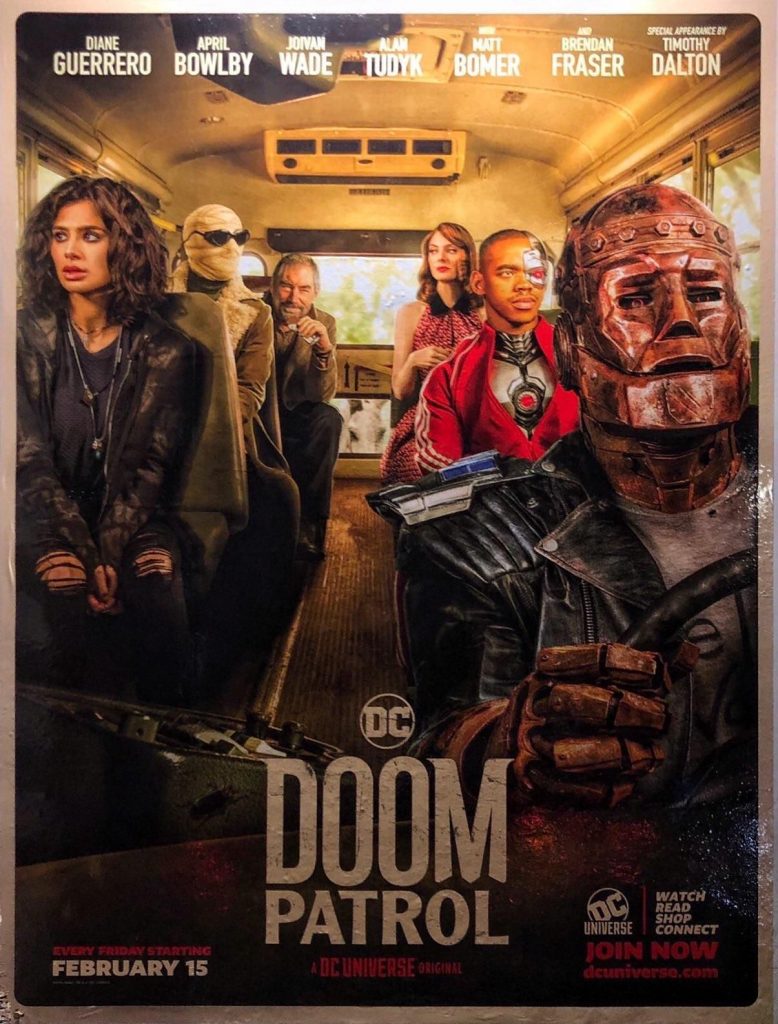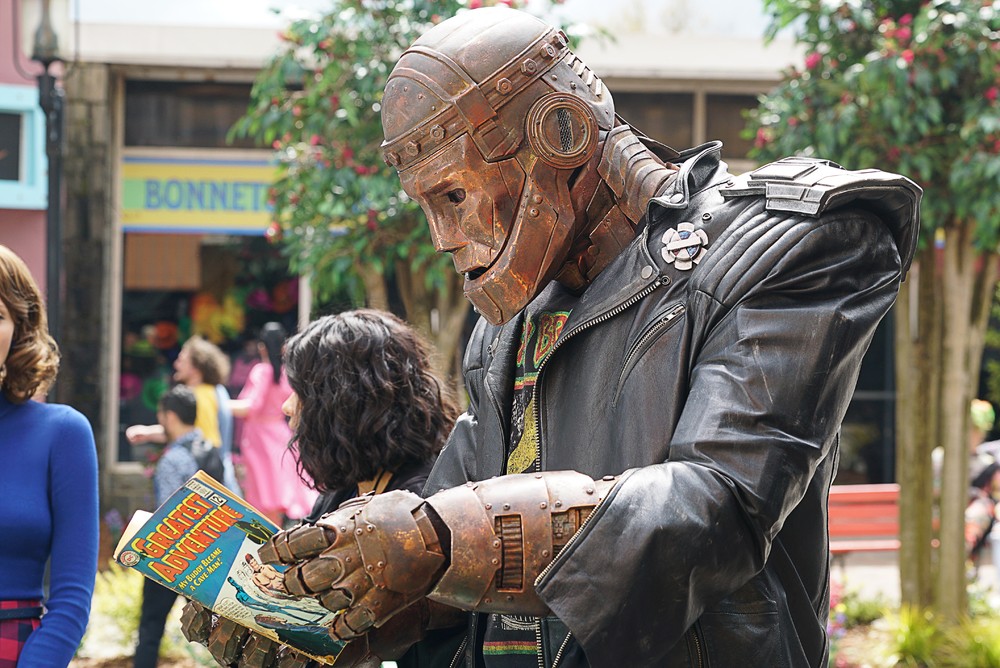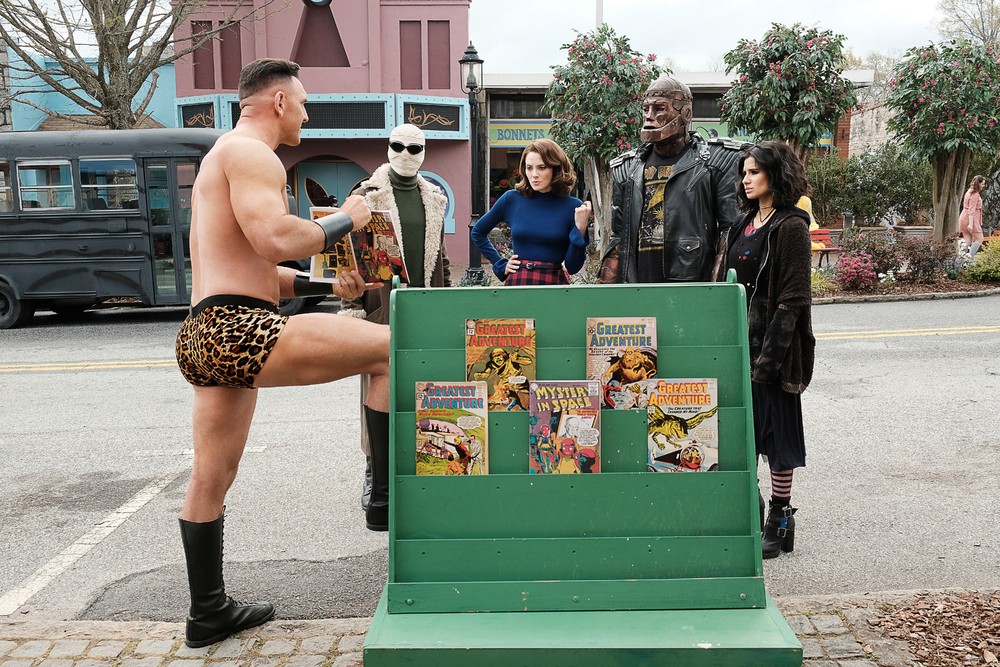Review: DOOM PATROL 1×14 – “PENULTIMATE PATROL”

[Editor’s Note: This review may contain spoilers]
Director: Rebecca Rodriguez
Writers: Chris Dingess
Starring: Brendan Fraser, Matt Bomer, April Bowlby, Diane Guerrero, Joivan Wade, Hannah Alline, Timothy Dalton, Alan Tudyk, Riley Shanahan, Matthew Zuk, Tommy Snider, Phil Morris, Devan Chandler Long, Ashley Dougherty, Victoria Blade, Julie McNiven
Reviewed By: Ari Bard
Summary
It’s the penultimate episode, and the Doom Patrol must find the Beard Hunter in order to track down the Chief and Mr. Nobody. It’s a journey that will reunite the gang with some old friends and new feeling as embark on the biggest battle they’ve ever known.

Positives
“Penultimate Patrol” is the penultimate episode, and it knows and uses that to its advantage. The episode is full of every reference, action sequence, character moment, and humorous beat any fan would ask for. Each scene is immaculately constructed to provide a complete package. The episode opens on a gloomy night in 1946 in a restaurant reminiscent of a simpler time. Smooth jazz plays while rain and thunder roar in the background as a true villain is born. The moment is complete with references to the Brotherhood of Evil, jokes at Mr. Nobody’s expense, and the motivations behind Mr. Nobody’s origins. What more could you ask for?
Another great part about Doom Patrol is that its shows you sides to characters that you didn’t know they had. Larry becomes a lot more talkative this episode in ways that may remind viewers of the Titans episode he starred in, and it really puts a smile on your face. Even Larry is itching for some action and it’s only fitting that the quest to find the Beard Hunter leads the gang back to Danny the Street. Matt Bomer’s performance continues to come across as genuine and fantastic. When tormented with his past and the way he treated his family, Bomer looks sorrowful and realize its time for him to live his whole life.
One of the best things about Doom Patrol is that characters realize the meaning behind their own journeys. There is a self-realization that isn’t present in other shows. Other character simple begin in one place and end in another with no actual reflection that they’ve grown. Sometimes there are recap episodes or flashbacks to remind viewers, but rarely does it ever dawn on the character. Each one of these character knows their own growth and their capabilities to grow further, and it drives each and everyone one of them. It fuels April Bowlby’s performance as she impeccably portrays someone who has not only that she was a monster before she was transformed, but she has also grown to rediscover herself and to learn where beauty, strength, and grace truly come from. It’s a phenomenal performance and her character on the show doesn’t only inspire the other character to be better, it inspires you to be better.
The characters on the show continue you to be as deeply flawed and human as we are, but also grotesque appearances and abilities to boot. They swear, argue, laugh, cry, and get physical with each other. The feel pain, loss, regret, joy, wonder and pleasure the same way we do. Jane, despite having a mental illness almost no one can relate to, is still as human as they come. She is a victim of abuse who uses hurtful words and actions to mask her own internal pain. She claims not to care about anyone or anything but herself, but has small vulnerabilities with those around her which shows that its not true. If anything, Jane actually cares the most. She repeatedly takes actions for others and on behalf of others, even if “others” mean her other personalities. She is the first to step into a fight for her or for someone else because she finally feels loved and accepted with the Doom Patrol, but she is afraid that love and acceptance will abandon her or corrupt into something rotten like it did in her childhood.
The characters’ changes and growth over time are displayed through Alan Tudyk who may play the villain, but also provides the tools the heroes need. Rita literally takes control over her own narrative as a symbol of triumph. It may feel a little on the nose, but that’s because it is, and it’s hilarious. The entire climax takes place with no setting, NONE! The character are surrounded by white space and with nothing else to stare at, you’re forced to look at the characters. It’s an intelligent move for the penultimate episode.

Negatives
“Penultimate Patrol” in many ways, the essence of perfect wrapped up in a nice little package. It is so neatly balanced that it almost doesn’t feel human but rather a formula trying to piece together everything from the comic runs in a way that will please the fans. Normally this wouldn’t be much of a problem, but the show’s inorganic nature really comes through during this episode. The very crux of “Penultimate Patrol” revolves around getting to the “white space.” In Morrison’s run, he played with the medium and made the “white space” the space between the panels. In comic books this is something creative and transformative. It evokes a feeling of awe in the reader as the comic does something they didn’t even know was possible. Use the white space? The space between the panels? This is a comic referencing elements within itself! That’s unheard of! But the quest for the TV show shouldn’t be replicating the act, rather replicating the awe for its viewers. Instead, the show chooses to have Flex Mentallo hold up a picture of a comic and have the Doom Patrol focus at the space between the panels. Holding up a picture of a comic is not nearly as inspiring as when the story was being told within a comic. Instead, the White Space could be the space between television frames or the some equivalent form of digital white space. Instead of focusing away from the viewers and at a small comic book on-screen trying to get from their dimension between their world and another, the Doom Patrol could be looking right at us trying to get to the space between their world and ours.
There are numerous moments like the one above where, instead of trying to adapt the feeling, they just adapt the actions from the comics, and while it still isn’t like anything we’ve seen before, that’s because Morrison’s run wasn’t like anything we’d ever seen before, but it doesn’t have the same spark and imaginative feel as the original. In its quest for balance, the show comes across as a bit robotic. This particularly occurs when two scenes with drastically different tones are cut back and forth. The first scene is purely for comedic effect and features Flex Mentallo flexing the wrong muscle and causing everyone on Danny Street, except Cliff who can’t feel anything, to have one long orgasm. It is purely for spectacle and comedy as it reveals nothing about any of the characters and has no lasting effects. This scene cuts back and forth with a scene of Cyborg learning the truth about his accident from his father and that his father had to choose to save Vic or his mother. This is a scene Cyborg’s character has been building to the entire season. He’s known something isn’t right with his memories and this scene affirms his suspicions and confirms his father’s betrayal after all. It is a scene fueled by realization and pain, surrounded by shadows on all sides and filled with a dark aesthetic. Juxtaposing this meaningful character moment with a sexual comedy gag actually undercuts the prior. It feels sudden and jarring in a bad way. You have a horrible taste in your mouth as the camera pans back and forth between the two. In its quest for balance, the “Penultimate Patrol” has forced two puzzle pieces together that don’t quite fit.
A penultimate episode needs to build. It needs to put the finale pieces in place for the ultimate finale of moments, feeling actions, an emotions. It needs to get readers excited and leave them in suspense. This episode sort of leaves you at a loss. The penultimate episode offers our heroes the ultimate choice: If they leave the Chief be, they can have their lives back before each of them had their accidents. It’s the ultimate what-if scenario. The ultimatum represents the decision to accept growth versus the ease of regressing and returning to comfort. It feels like a final decision, but it’s not. Instead, what is left for the finale is the ultimate truth bomb. The idea that the Chief has been behind it all the whole time. But this bomb doesn’t explode, rather it fizzles. We haven’t had two years and 57 issues to become enamored with the Chief, his leadership, or the heroic quest to rescue him. We’ve had three and a half months, 14 episodes and 13 hours of content. That’s not nearly enough to firmly love and respect a character, even if it is portrayed by Timothy Dalton. It’s all relative, and compared to how much growth the Doom Patrol has done this season without the Chief by their side, this revelation doesn’t seem all that strenuous in return. This truth is going to hurt the Doom Patrol. It is going to change them. But is it going to break them after all they’ve been through? It sure doesn’t feel like it.
Verdict
“Penultimate Patrol” reminds you why you fell in love with these characters. It shows amazing character moments of how any why these characters were able to overcome the fears they’ve had all season. It reminds you how and why characters made this show and how tragedy behind comedy is what causes this show to triumph. But that doesn’t mean we can overlook flaws in other narrative elements. The creativity and storytelling take a back seat in this episode at the character’s expense. Doom Patrol is still unlike anything else on TV, but that doesn’t mean it can be better, nor does it mean that we shouldn’t push it to be the best it can be.
